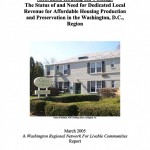Advocating for walkable, bikeable, inclusive, and transit-oriented communities as the most sustainable and equitable way for the Washington, DC region to grow and provide opportunities for all.
Get Involved
Take Action
Events
Prince George’s vision for safer streets, more choices, better communities,
Join us online with an all-star panel to explore county
Learn about the Transit Vision Plan for Prince George’s
Transit is key to a competitive and sustainable future for
Get Involved
Latest Happenings

DC – A Working Vision for Downtown Ward 7
A plan to revitalize downtown Ward 7, based on a series of community workshops in 2005.
DC – Rhode Island Avenue Parking
WRN has worked extensively with community members around the Rhode Island Avenue Metro station. We have conducted workshops, walking audits and developed a set of recommendations to make the Rhode Island Avenue Metro station more accessible to the community that it serves. We have also supported the detailed analysis conducted by D.C. Office of Planning which demonstrated that many more Metro riders could be served by improving walk, bicycle and bus access to the Metrorail station at the same cost of replacing the 387 commuter parking spaces.

Manassas Battlefield Park Bypass Study Draft EIS
We have reviewed the Battlefield Bypass DEIS and have found a number of noteworthy deficiencies that significantly affect the conclusion that four lane bypasses are required to replace Routes 29 and 234 through the Manassas Battlefield National Park.

DC – Affordable Housing Isn’t Cheap: The Status of and Need for Dedicated Local Revenue for Affordable Housing Production and Preservation
"Affordable Housing Isn’t Cheap" is a report on the status of dedicated local revenue sources for affordable housing production and preservation in the Washington, D.C. region. It provides guidance to area jurisdictions that have yet to implement a dedicated local revenue source. This report describes dedicated revenue sources that already exist and forecasts what type and size of dedicated revenue sources make sense for each jurisdiction. Nearly all new affordable housing for lower income households across the country is created through partnerships between government funding agencies and private for- and non-profit developers. The public funding role is crucial because constructing housing is almost always not financially feasible at the rents or mortgage payments that lower income households can afford to pay, especially in areas with high housing costs like the Washington, D.C., region. Legal restrictions that accompany this public investment ensure that this housing will remain affordable to lower income families for varying amounts of time.
DC – Campaign for Mandatory Inclusionary Zoning Fact Sheet
Inclusionary Zoning (IZ) policies require new and/or rehabilitated residential developments to include housing units affordable to low and moderate-income residents. In exchange, developers may receive non-monetary compensation—in the form of density bonuses—that reduce construction costs.

